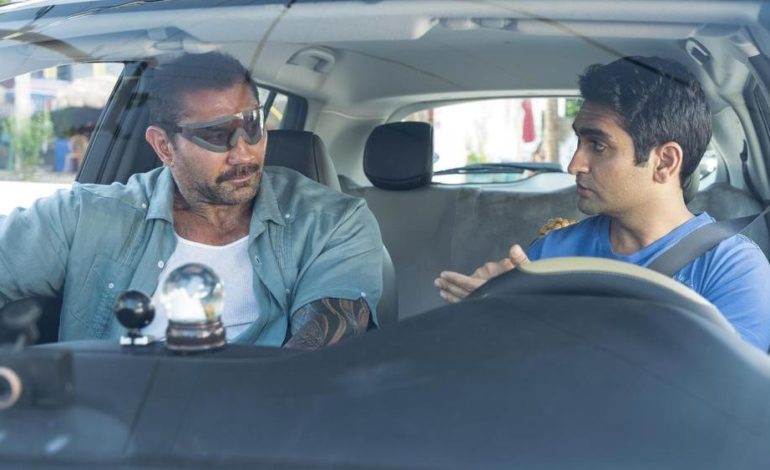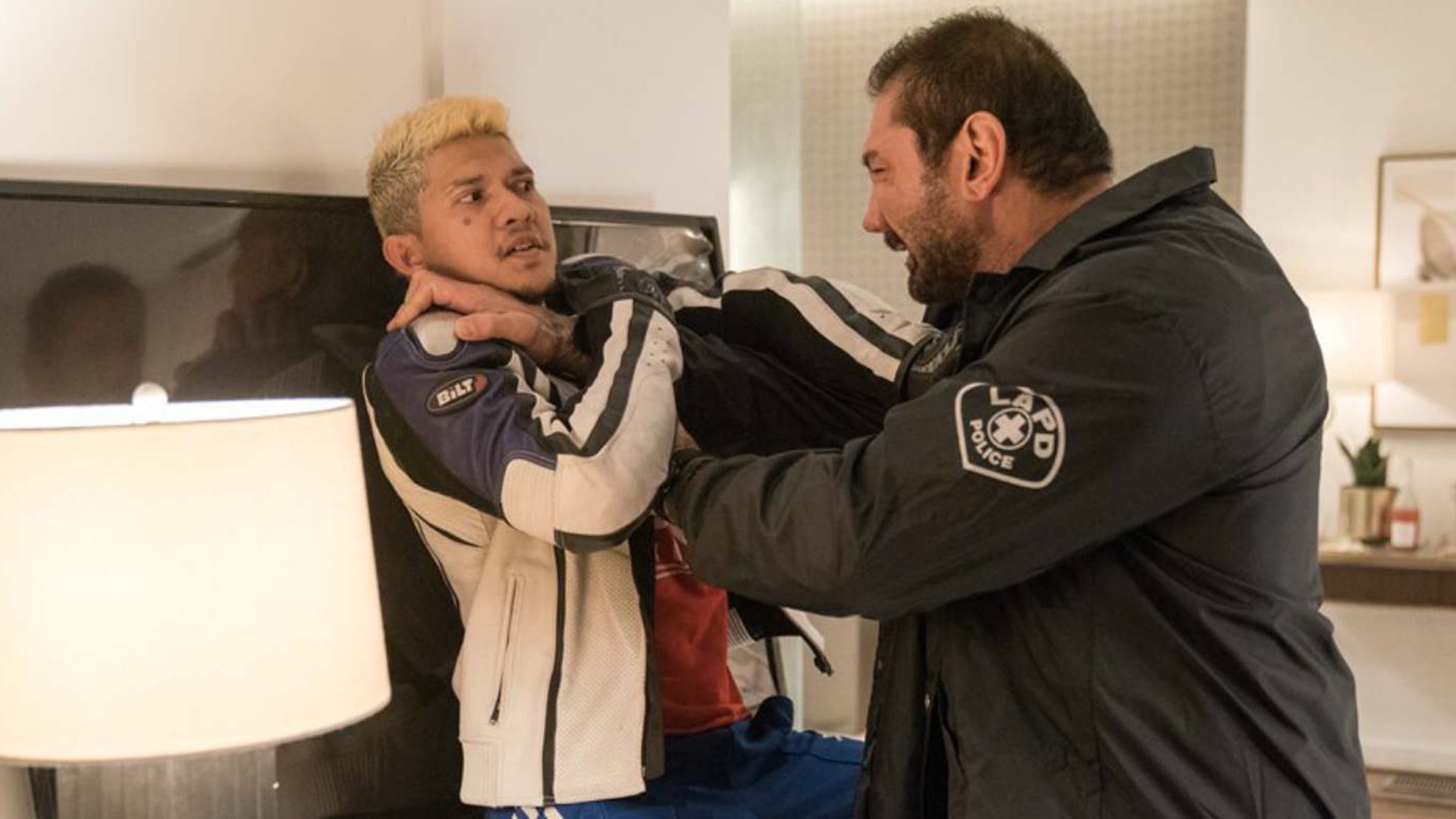

Judging by its trailers, one might expect Stuber to be the comedic version of Michael Mann’s Collateral. Average joe driver picks up a passenger with a gun and a mission and must begrudgingly tag along for the ride. But where Collateral elevated itself beyond genre clichés into something fantastic, Stuber’s subversion of the buddy-cop premise is more quasi-meta, mainly in its jabs toward toxic masculinity. Unfortunately some decent jokes and comedic chemistry between Kumali Nanjiani and Dave Bautista aren’t enough to overcome a formulaic plot and some egregiously awful actions scenes. And when you make a fight between Drax the Destroyer and The Raid’s Iko Uwais unwatchable, you’re doing something wrong.
Like most buddy films, the duo are physical and emotional opposites. Stu (Nanjiani) is an overly polite sports good employee who doubles as an Uber driver, earning him the demeaning nickname “Stuber” by his obnoxious boss Richie (Jimmy Tatro). Vic Manning (Bautista) is an LAPD officer trying to catch ruthless narcotics dealer Oka Teijo (Uwais) before his case goes to the feds. His reason is pure movie rationale: Teijo killed his partner Sarah (a rather wasted Karen Gillan) in an arrest gone wrong, which also cost Vic his glasses and left him near blind. One wants to see justice served, the other just needs to keep his rating above four stars.


After Vic undergoes laser eye surgery to get his sight fixed, he’s told by his daughter Nicole (Natalie Morales), to wait it out at home. That plan soon goes awry after he learns about Teijo making a new drug deal that evening. Unable to drive himself due to his healing eyesight, Vic reluctantly calls Uber for a lift, thus bringing Stu into the mix. Still, Stu needs the five star rating, as it’ll help raise enough money to open a spin gym with his friend Becca (Betty Gilpin), with whom Stu wants to move beyond FWB status. And what should have been a casual drive becomes a police escort mission across L.A. as the two interrogate criminals, evade shootings and undergo bad action choreography. And there’s a handful of jokes tucked into the mix.
If it seems like I’m being hyperbolic on the bad action in this action-comedy, the reality is a lot worse. The opening fight in Teijo’s hotel room is a big indicator of what director Michael Dowse storyboarded: a confusing mess of close-up shots, shaky-cam and quick cuts that renders Bautista and Uwais’ movements all but incomprehensible. Basically the complete opposite of what made John Wick Chapter 3’s choreography work. This filmmaking style continues far too often and feels like a disservice to Bautista and Uwais, both of whom know how to put on a show with their combat skills. It doesn’t help that the latter is given barely anything to do as a villain.
The comedy, on the other hand, is more of a mixed bag. Neither lead actor is devoid of comedic chops, with Bautista continuing the deadpan delivery and physicality that boosted his post-Guardians career. Here he’s essentially Mr. Magoo, if Magoo bench-pressed a bear and acted like a parody of the 80’s macho man who never cries. Vic’s gruffness contrasts with the hapless Stu, whose actions consist of screaming at danger, ad-libbing his reactions to ongoing violence and insisting Vic open up more. He can’t out-macho Vic- riding in an Uber rarely screams badass- but playing the straight man gives Nanjiani a few funny moments, particularly when Stu “tortures” a suspect by hijacking his social media feed.
There’s supposed to be a point to these comedic interactions, a critique of sorts on toxic masculinity. All the shootouts, punches and explosions guiding this journey and, by extension, the entire buddy cop subgenre- they just reflect how society expects men to never express themselves emotionally. Stu gets it but Vic doesn’t want to, even if it further complicates his relationship with Nicole, whose art show is conveniently happening that night. Trying to equate that rationale, however, with Stu growing an action hero pair so he can finally settle his relationship problems, comes across as contradictory to the film’s message.


Stuber’s banter works best during its “fight or flight” moments when Stu and Vic must react to one another’s flaws as they evade the chaotic absurdity of their mission. You can see the actors enjoying themselves as they bounce comedic jabs off one another, which feel more fluid than the underlying woke message. Unfortunately, this doesn’t make up for compelling drama, hindered in part by how little the female characters are given to do. Bautista’s Guardians co-star Karen Gillan is regulated to the prologue, Vic’s daughter exists mainly to remind him that he needs to work on parenting, and Betty Gilpin’s role is mostly to video-chat Stu at random points about her relationship problems. If the protagonists’ personal drama are tied to their external relationships, then writing those relationships so bare-bones renders their growth mute.
Still, neither protagonist feels wholly unlikable, and Stuber rides or dies (pardon the pun) on whether viewers buy their bond of collective vulnerability. Some people will find this reluctant bromance endearing; others will think it needs more depth. I thought it was a mix of both. But when Nanjiani and Bautista’s on-screen chemistry works, you can see the type of buddy comedy Stuber wants to be, even if the best Uber-themed jokes still feels like a “kinda, sorta” product placement. It wants to be existentially deep, but the execution feels surface-level.
Grade: 2.5 out of 5 Stars
Stuber isn’t a five-star ride, but it will give you a few good laughs. The odd couple dynamic between Nanjiani and Bautista is undoubtedly its strongest element, even if the characters themselves aren’t that interesting. With a thin plot and bad action choreography wasted on talented physical performers, your mileage will vary on whether it’s funny enough to warrant a second viewing. I’d say Stuber is worth at least watch, but for a subversive buddy cop film it needed a few more driving lessons.
